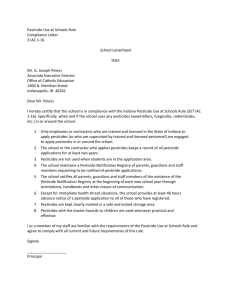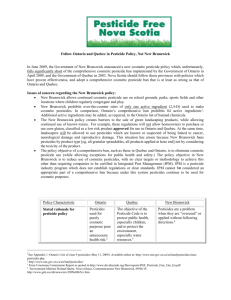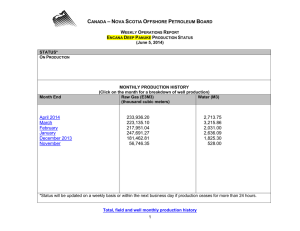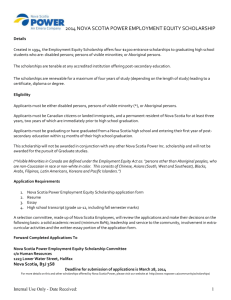Eliminate the Sale and Use of Cosmetic Pesticides
advertisement
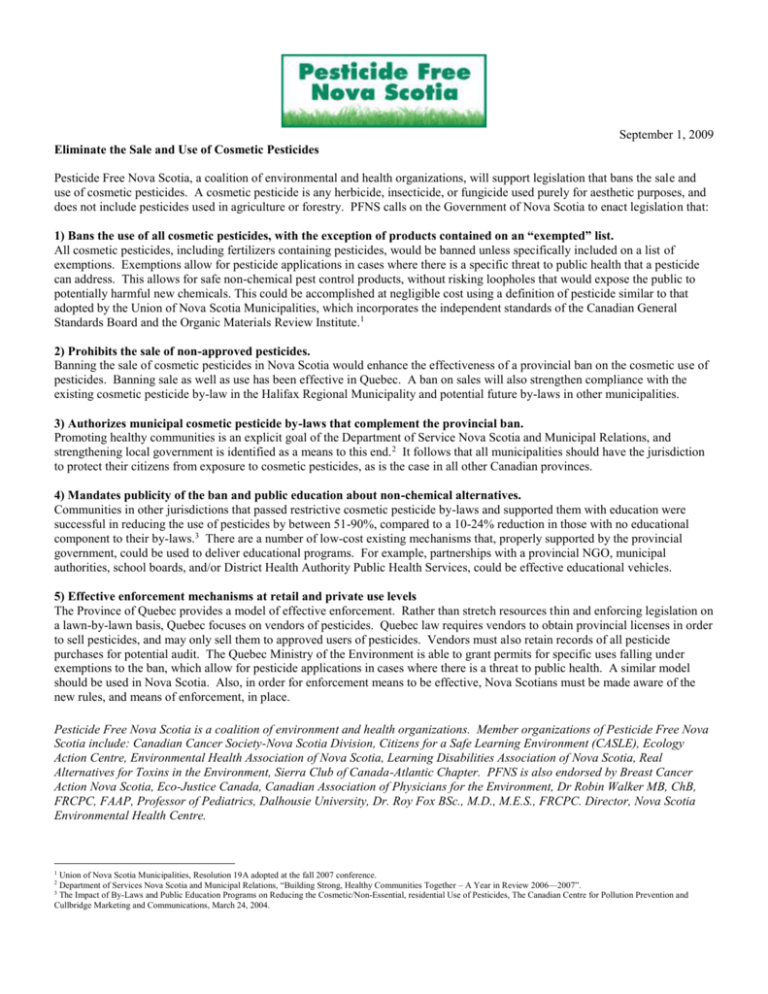
September 1, 2009 Eliminate the Sale and Use of Cosmetic Pesticides Pesticide Free Nova Scotia, a coalition of environmental and health organizations, will support legislation that bans the sale and use of cosmetic pesticides. A cosmetic pesticide is any herbicide, insecticide, or fungicide used purely for aesthetic purposes, and does not include pesticides used in agriculture or forestry. PFNS calls on the Government of Nova Scotia to enact legislation that: 1) Bans the use of all cosmetic pesticides, with the exception of products contained on an “exempted” list. All cosmetic pesticides, including fertilizers containing pesticides, would be banned unless specifically included on a list of exemptions. Exemptions allow for pesticide applications in cases where there is a specific threat to public health that a pesticide can address. This allows for safe non-chemical pest control products, without risking loopholes that would expose the public to potentially harmful new chemicals. This could be accomplished at negligible cost using a definition of pesticide similar to that adopted by the Union of Nova Scotia Municipalities, which incorporates the independent standards of the Canadian General Standards Board and the Organic Materials Review Institute.1 2) Prohibits the sale of non-approved pesticides. Banning the sale of cosmetic pesticides in Nova Scotia would enhance the effectiveness of a provincial ban on the cosmetic use of pesticides. Banning sale as well as use has been effective in Quebec. A ban on sales will also strengthen compliance with the existing cosmetic pesticide by-law in the Halifax Regional Municipality and potential future by-laws in other municipalities. 3) Authorizes municipal cosmetic pesticide by-laws that complement the provincial ban. Promoting healthy communities is an explicit goal of the Department of Service Nova Scotia and Municipal Relations, and strengthening local government is identified as a means to this end. 2 It follows that all municipalities should have the jurisdiction to protect their citizens from exposure to cosmetic pesticides, as is the case in all other Canadian provinces. 4) Mandates publicity of the ban and public education about non-chemical alternatives. Communities in other jurisdictions that passed restrictive cosmetic pesticide by-laws and supported them with education were successful in reducing the use of pesticides by between 51-90%, compared to a 10-24% reduction in those with no educational component to their by-laws.3 There are a number of low-cost existing mechanisms that, properly supported by the provincial government, could be used to deliver educational programs. For example, partnerships with a provincial NGO, municipal authorities, school boards, and/or District Health Authority Public Health Services, could be effective educational vehicles. 5) Effective enforcement mechanisms at retail and private use levels The Province of Quebec provides a model of effective enforcement. Rather than stretch resources thin and enforcing legislation on a lawn-by-lawn basis, Quebec focuses on vendors of pesticides. Quebec law requires vendors to obtain provincial licenses in order to sell pesticides, and may only sell them to approved users of pesticides. Vendors must also retain records of all pesticide purchases for potential audit. The Quebec Ministry of the Environment is able to grant permits for specific uses falling under exemptions to the ban, which allow for pesticide applications in cases where there is a threat to public health. A similar model should be used in Nova Scotia. Also, in order for enforcement means to be effective, Nova Scotians must be made aware of the new rules, and means of enforcement, in place. Pesticide Free Nova Scotia is a coalition of environment and health organizations. Member organizations of Pesticide Free Nova Scotia include: Canadian Cancer Society-Nova Scotia Division, Citizens for a Safe Learning Environment (CASLE), Ecology Action Centre, Environmental Health Association of Nova Scotia, Learning Disabilities Association of Nova Scotia, Real Alternatives for Toxins in the Environment, Sierra Club of Canada-Atlantic Chapter. PFNS is also endorsed by Breast Cancer Action Nova Scotia, Eco-Justice Canada, Canadian Association of Physicians for the Environment, Dr Robin Walker MB, ChB, FRCPC, FAAP, Professor of Pediatrics, Dalhousie University, Dr. Roy Fox BSc., M.D., M.E.S., FRCPC. Director, Nova Scotia Environmental Health Centre. 1 Union of Nova Scotia Municipalities, Resolution 19A adopted at the fall 2007 conference. Department of Services Nova Scotia and Municipal Relations, “Building Strong, Healthy Communities Together – A Year in Review 2006—2007”. The Impact of By-Laws and Public Education Programs on Reducing the Cosmetic/Non-Essential, residential Use of Pesticides, The Canadian Centre for Pollution Prevention and Cullbridge Marketing and Communications, March 24, 2004. 2 3


